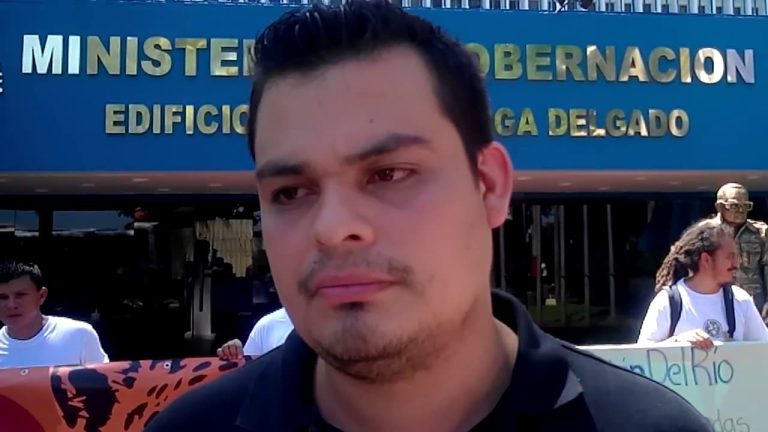13 de septiembre 2021

Children of Exile: The Births “Sowing Hope” in the Camp of Nicaraguan Farmers

PUBLICIDAD 1M
PUBLICIDAD 4D
PUBLICIDAD 5D
The Public Ministry accuses the president of Fundacion del Rio for “trying to create a climate of instability in Nicaragua"

El biólogo Amaru Ruiz. Foto/Archivo Confidencial
On Wednesday, September 8, Nicaragua’s Public Prosecutor’s office charged environmentalist Amaru Ruiz Aleman with the alleged crime of “spreading false news using information and communications technologies.” Ruiz is the first Nicaraguan to be accused of this specific crime, and the third to be charged under Law 1042, the Special Cybercrimes Law. This law, was one in a series of repressive laws the FSLN pushed through the National Assembly in December 2020.
Ruiz, who is in exile and thus beyond the regime’s reach, is a Nicaraguan environmentalist with a long history of activism. He’s been a strong critic of Daniel Ortega and was president of the “River Foundation”, one of the NGOs whose legal permission to operate was abruptly cancelled by the Ortega regime in April 2018. The River Foundation was one of the first organizations to spread the alarm about the huge 2018 forest fire in the Indio-Maiz biological reserve.
According to the Prosecution, Ruiz offered “false information about events occurring in the years 2020 and 2021. The events referred to took place in the communities of the North Caribbean Coast, where 13 indigenous people were murdered. Ruiz allegedly posted: “the State and its institutions have deliberately neglected their duty to investigate these crimes.” Officials, however, denied this allegation, saying that “there’s currently a legal case” against the presumed authors of the crime. Up until that date, said legal process wasn’t public knowledge.
The Prosecution asked for the arrest of the environmentalist and accused him of “trying to create a climate of instability and insecurity that endangers the national sovereignty”. This accusation is also related to the August massacre of 13 indigenous people at the hillside community known as Kiwakumbaih. According to the Prosecutor, the event is under investigation.
On September 2, the Prosecution began for the first time to apply the “Cybercrimes Law”. They charged two clients of a financial entity with crimes of: “unauthorized release [of information]; unlawful access to computer data or programs; and disclosure of computer data”, according to the online newspaper La Prensa.
Several other journalists who were questioned by the Public Prosecutor noted that in the course of their interrogation, the prosecutors threatened them with this law.
Opposition leaders remanded to trial
In addition to the charges against Amaru Ruiz, political prisoners Jaime Arellano, Francisco Aguirre Sacasa y Mauricio Díaz were remanded to await trial following an initial hearing held at the same “New Chipote” jail where most of the recent wave of political prisoners have been locked up. This was in contradiction to the Nicaraguan law, which mandates that such hearings should be held in a local court.
Arrellano, Aguirre, and Diaz are being tried for the alleged crime of “conspiracy to undermine the national integrity”, in accordance with articles 410 and 412 of the Nicaraguan Criminal Code, for harming Nicaraguan society and the State.
An unidentified judge upheld the pretrial detention order for Mauricio Diaz and Francisco Aguirre, while Jaime Arellano was ordered to remain under house arrest.
Beginning in May, the regime has intensified its persecution of opposition leaders and independent journalists. In the space of four months, 36 people have been arrested. Thirty-one of them have now been formally charged with alleged crimes of conspiracy, money laundering, illegal arms possession and spreading fake news.
Another eight independent professionals have also been accused but are not in the country. The regime now considers these people fugitives of justice.
This article was originally published in Spanish in Confidencial and translated by Havana Times
PUBLICIDAD 3M
Confidencial es un diario digital nicaragüense, de formato multimedia, fundado por Carlos F. Chamorro en junio de 1996. Inició como un semanario impreso y hoy es un medio de referencia regional con información, análisis, entrevistas, perfiles, reportajes e investigaciones sobre Nicaragua, informando desde el exilio por la persecución política de la dictadura de Daniel Ortega y Rosario Murillo.
PUBLICIDAD 3D